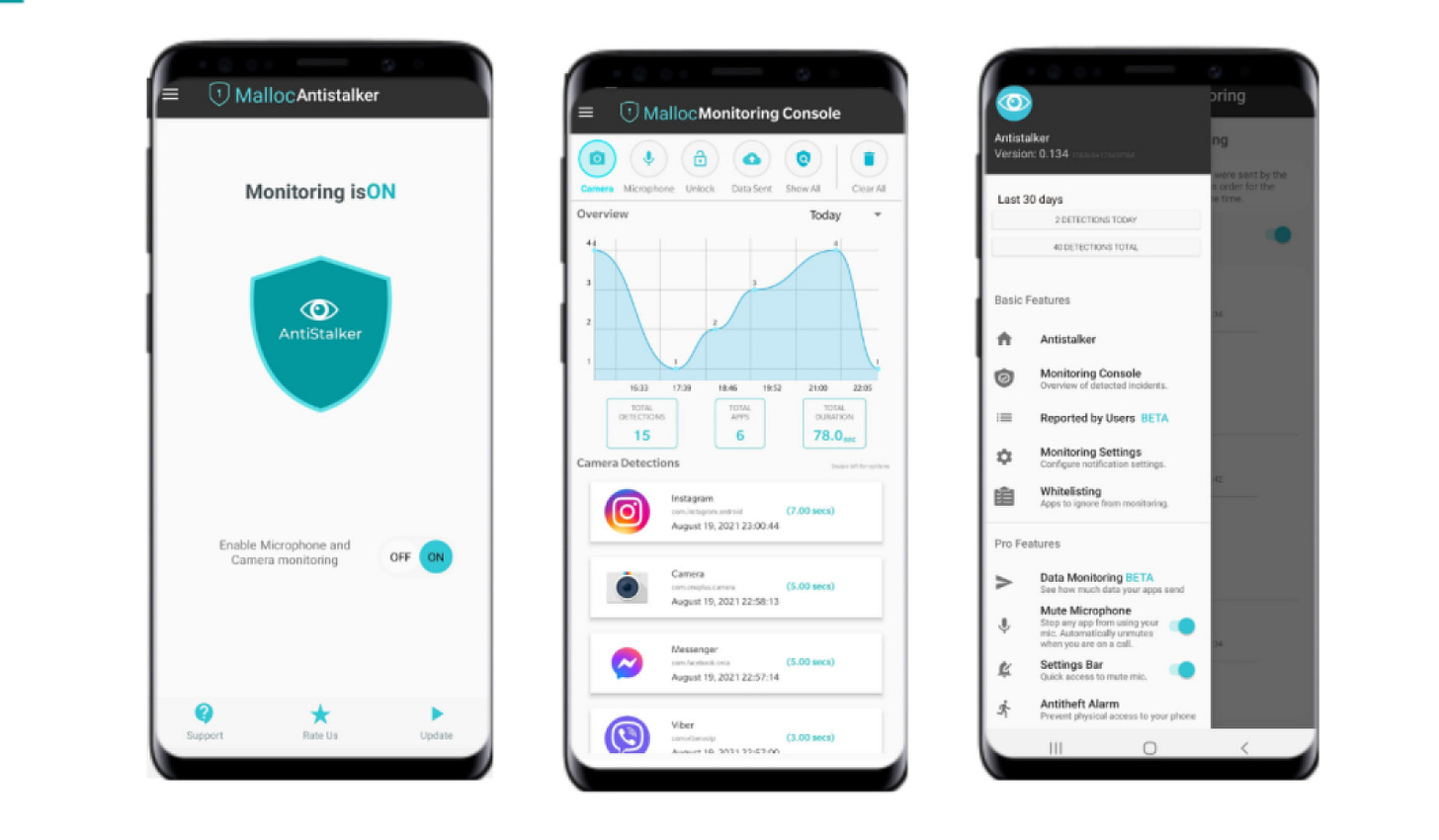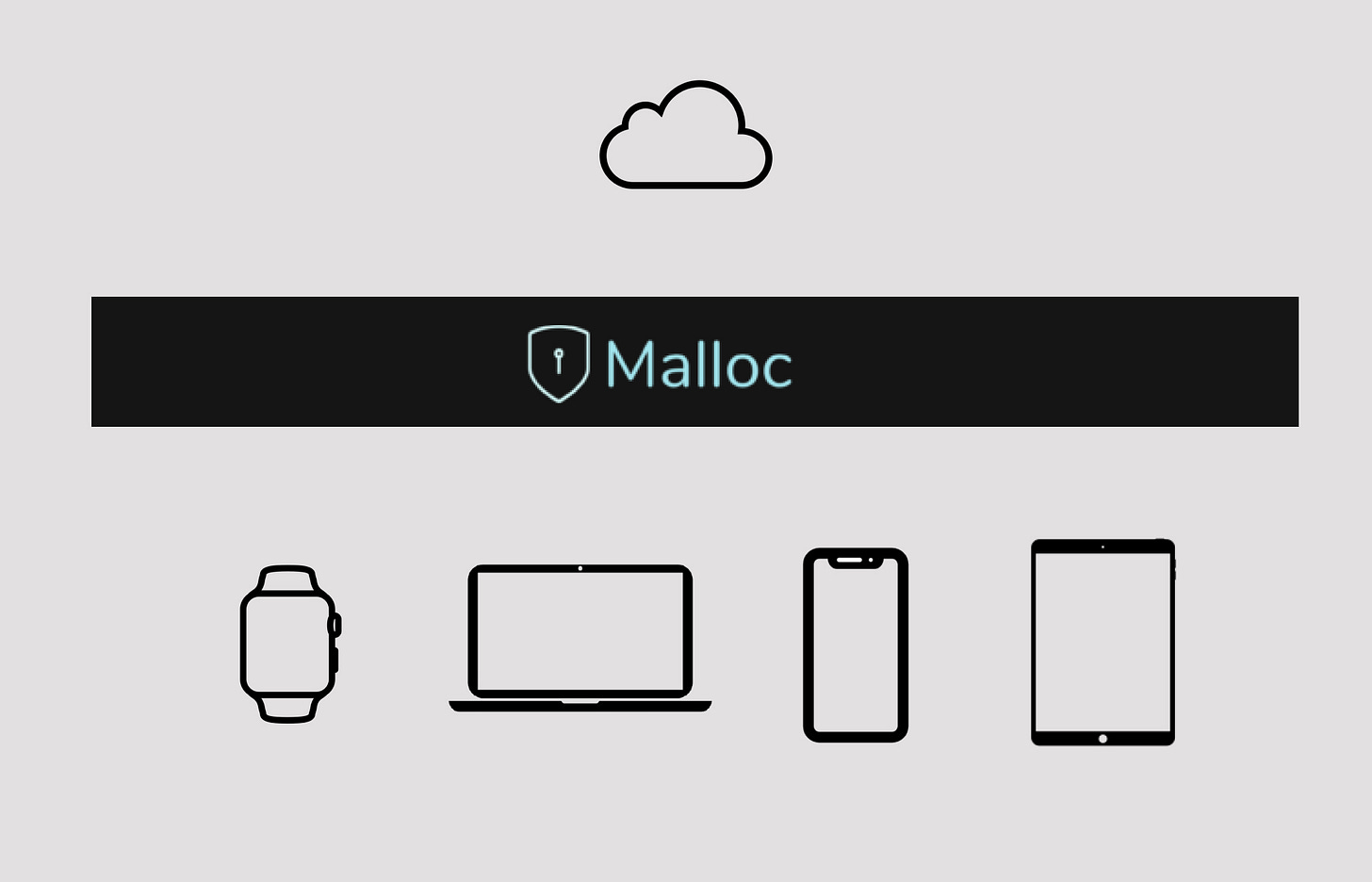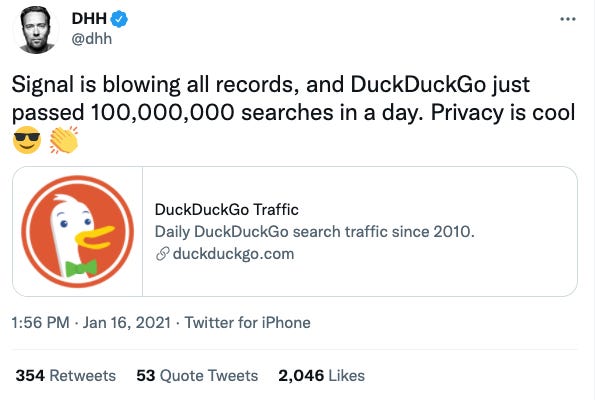Towards a Privacy-Conscious Internet
Building a next-gen privacy concierge with Malloc, Blueground's $180m Series C, six funding rounds, exit to Automattic, jobs, surviving a cyber attack, European EdTech, and more
Happy Friday! Welcome to Hunting Greek Unicorns #38. I’m Alex, a product guy turned VC, and every two weeks I send out a newsletter with everything you need to know about the Greek startup industry.
If you find this newsletter interesting, you can share it with your friends or subscribe, if you haven’t already, and join 2,768 readers.
Towards a privacy-conscious internet
What do Elon Musk and Tim Cook (CEOs of Tesla and Apple) have to do with three Cypriot PhDs based in Nicosia that just got funded by Y Combinator, the world’s most prominent startup accelerator?
Let’s deep dive into the story of Malloc!
Last January, Elon Musk urged people to use Signal, a messaging app that has become the privacy-focused consumer's go-to service (well, that tweet also triggered the share price of a small medical device firm called Signal Advance to jump from $0.6 to $70.85 🤦). A few days before, the world’s most popular instant messaging app, WhatsApp, had announced a controversial change to its privacy policy. Even though the company clarified that this only affected the way businesses communicate with customers through WhatsApp, it left many people wondering whether their personal data are shared with the app’s parent company, Facebook, ending up in advertisers’ hands. Below you can see the effect the news had on the number of downloads among Signal, Telegram (another messaging app that emphasizes focus on users' privacy), WhatsApp and Facebook Messenger.
Fast-forward to last summer, Apple announced during its annual worldwide developers conference, a whole lot of new privacy-related features (building upon a previous software update that empowered users to say no to apps surveilling their activity across other apps) on Mail, Safari, Siri, and more, with Tim Cook saying: “At Apple, we believe privacy is a fundamental human right”. Google is also pushing for privacy enhancements. For instance, it’s now forcing Android apps that haven't been used for a while to automatically lose their permission to access sensitive device features, such as sensors, SMS messages, and contact lists (with certain exceptions). Moreover, in 2019 the company launched an initiative called Privacy Sandbox with the aim to build a more private, open web, creating technologies that both protect people’s privacy online and enable publishers to build sustainable sites. Last but not least, Facebook’s VP of product marketing for ads mentioned during an interview a month ago that the company is examining several privacy-enhancing techniques to deliver personalized ads, without knowing anything about the specific individuals who view them.
What I think we see here unfold is a shift towards a more privacy-conscious internet. Yet, this leaves many of those giants in a weird spot. A lot comes down to what has been the internet’s lifeblood for years: advertising; with advertising revenues comprising over 80% of Alphabet’s revenues (Google’s parent company), and close to 98% of Facebook’s.
- Privacy software maker, Lockdown (founded by former Apple engineers) found that iPhone’s tracking protections are nowhere nearly as comprehensive as advertised and give a false sense of privacy, with apps communicating behind the scenes with third-party data companies.
- There are still court decisions pending for violations of user privacy for improperly recording and disseminating private conversations by Apple’s and Google’s voice assistants (here and here).
- Facebook was recently fined €225m for failing to live up to transparency requirements for WhatsApp, including how it explains its use of people's personal information, under Europe's privacy rules.
Clearly, the road to a privacy-conscious internet will be a bumpy one.
The perfect storm for a company like Malloc.
Meet Malloc
I met Maria Terzi, CEO and co-founder of Malloc, last summer, right before graduating from Y Combinator. Maria, a PhD in Machine Learning and Recommender Systems, winner of two Google hackathons and an ex-Googler, teamed up with Artemis Kontou, PhD in Mechanical Engineering from Imperial College London and holder of two patents, and Liza Charalambous, PhD in Electrical and Computer Engineering with expertise in AI and cybersecurity, to create a privacy layer on top of everything installed on your phone to monitor and prevent the recording and transmitting of your data without your knowledge. That’s how Antistalker by Malloc was born!
A few minutes into our conversation something she mentioned struck a chord:
“We did the Android beta launch in April 2021 to test the waters. Our focus was to detect spyware and let users know about it. In the first days, we noticed a large number of downloads coming from Egypt. After digging in, we realised most of these users were women installing Antistalker to detect whether their partners had installed spyware on their phones to track their actions.”
So spyware (remember Pegasus?) is software with malicious behaviour that gathers information (steal messages, photos, web browsing history, real-time location data, etc) and sends it to another entity in a way that harms the user, such as violating their privacy or endangering their device's security.
There was the first sign of product-market fit! In the months after launch, the app started making waves and getting used by privacy-minded individuals across the US, Europe, Brazil, Saudi Arabia, Australia and more. Whereas existing antivirus apps would look for spyware following a narrow-minded (e.g. the signature of the app) and reactive approach (only after the threat has been created and infected users), the Malloc team developed a machine learning algorithm that looks at the overall behaviour of an app, in real-time, to detect whether it’s a potential threat or not, being able to detect a broad range of new and previously unknown threats over time, sharing insights and even taking actions to prevent unwanted app behaviour.
Did your camera or microphone open, when it shouldn’t? Did an app send data to a server at a time when it wasn’t supposed to? Did an app send data to a server, even if you hadn't turned it on for days?
Maria said there’s an extra privacy precaution that differentiates Malloc from most solutions out there:
“We do all our processing and run our ML models on the device, which prevents sending any local user data to the cloud”
A few months in, Antistalker is now used by more than 100,000 people and just secured close to a $2 million funding round! Now, here’s another interesting part: looking at thousands of data reported by users, the team realised it wasn’t just malicious apps that could harm their privacy. Everyday apps were also demonstrating suspicious behaviour.
“We have identified an app that takes a picture of you every time you turn it on, applications that send data even when you are not using them; we even detected applications that use your camera when clearly you are not using your phone.”
The road towards a more privacy-conscious internet
Malloc is building the privacy layer for personal technology devices to help protect people’s privacy. They started with an Android app, preventing applications from using your microphone or camera or sending data without you knowing, launching an iOS app soon and products tailored to the enterprise world. A key question one might have is whether these are privacy-enhancements that should be introduced at the operating system level i.e. from Apple, Google, Microsoft or whoever is building the OS of the device. And if so, then whether you’d trust that these are properly introduced, given the past actions of some of these companies.
I think the answer is that the market for privacy-focused platforms exists and is growing.
DHH’s (founder of Basecamp) favourite search engine, DuckDuckGo saw a 62% growth in average daily searches in 2020 (here), while Brave (a privacy-focused web browser) went from 11.6 to 25.4 million monthly active users in 2020 (here).
There is some great upside for the company that manages to build the next-gen, go-to consumer and enterprise privacy concierge for mobile phones. Double that upside, if we’re talking about all personal technology devices. Just like Elon Musk, who urged people to start using Signal and Tim Cook, who argues that privacy is a fundamental human right, the team at Malloc is paving the way towards a more privacy-conscious internet. One thing is certain though: as long as advertising remains the internet’s lifeblood, this road will be a bumpy one.
If you are interested to learn more about Malloc, check out their website or the Antistalker app or reach out to Maria on LinkedIn!
🦄 Startup Jobs
Looking for your next opportunity? Check out job postings from Greek startups in Greece, abroad, and remotely. Company information is also available.
🗞️ News
Massive $180m Series C funding (equity + debt) for Blueground at a $750m valuation, here! This is the largest reported equity round ever for a startup in Greece. Hats off to the whole team 🙌
$60m Series B round for Lifebit, a startup revolutionising genomics and bioinformatics, led by Tiger Global. Its platform allows wider access to global biomedical data for drug discovery.
Metrika announced a $14m Series A round from Neotribe, Coinbase Ventures and others to further grow its blockchain monitoring technology. Customers include Algorand, Solana, Dapper Labs and more.
TileDB raised a new funding round to advance their universal database, from Lockheed Martin Ventures and NTT Docomo Ventures.
Bootstrapped startup SomewhereWarm joined WooCommerce (owned by Automattic, alongside WordPress, Tumblr and more). SomewhereWarm had developed some of the most successful commercial add-ons for WooCommerce.
Baresquare, an action-driven analytics platform, raised a $2.5m round led by btov to help businesses use data to act fast.
Community toolkit developer for Solana, Grape Protocol, raised $1.8m from Multicoin Capital and other investors. The team previously won Solana’s hackathon and is now used by projects like Degen Ape Academy and Saber.
Acquired a startup in Greece; building an engineering hub. News we're seeing more and more lately. The competition for great tech talent in the country is heating up! More updates from the Sitecore acquisition of Moosend, here.
Winners of Next Stage Challenge 2021, a startup competition for startups in Northern Greece, are METIS, AidPlex, SEAMX.
Plum launched a crowdfunding campaign on Crowdcube.
💡Startup Profiles
Prosperty, Cyclopt, Flexfin, Kaedim
🤓 Interesting Reads
A crazy story by Eleftherios Karabatsakis, co-founder and CEO of Carge, getting maliciously hacked as an early-stage startup, how they handled the event and are now back on track with customers supporting them.
A post by Zaharenia Atzitzikaki, Design leader and previously VP at Workable, on interviewing candidates.
George Koureas, Associate Product Owner at Spitogatos, discussing Associate Product Manager programs as a way to kickstart a PM career.
Nikos Kafritsas, Data Scientist at Persado, on time series classification using Dynamic Time Warping, here.
🎧 Podcasts
A podcast with Elias Simos, Protocol Specialist at Coinbase, and Panos Papadopoulos, Partner at Marathon Venture Capital, discussing layer 2 blockchain protocols, Polkadot, Ethereum 2.0 and more.
A podcast with Alex Spiro Latsis, Partner at Brighteye VC, on the European EdTech market, differences compared to the US, future of learning and more.
Lefteris Karapetsas, Ethereum developer and creator of Rotki, discussing his crypto journey, and building an open-source portfolio tracking and tax reporting app.
🍕 Events
Interesting events coming up from the Greek tech community:
“React 2 React Athens MeetUp #3” by React 2 React Athens MeetUp on October 6
“VueJS Athens Meetup #6” by VueJS Athens on October 7
“Scale-up Greece meetup October 2021: LearnWorlds” by Scale-up Greece Meetup on October 13
How did you like this week’s Hunting Greek Unicorns? Your feedback helps me make this great.
Loved | Great | Good | Meh | Bad
If you want to get all the latest updates from the Greek startup scene as they happen, and enjoy reading about startups, product, and growth, you can also follow me on Twitter!
Thanks for reading and see you in two weeks,
Greek Startup Pirate 👋










